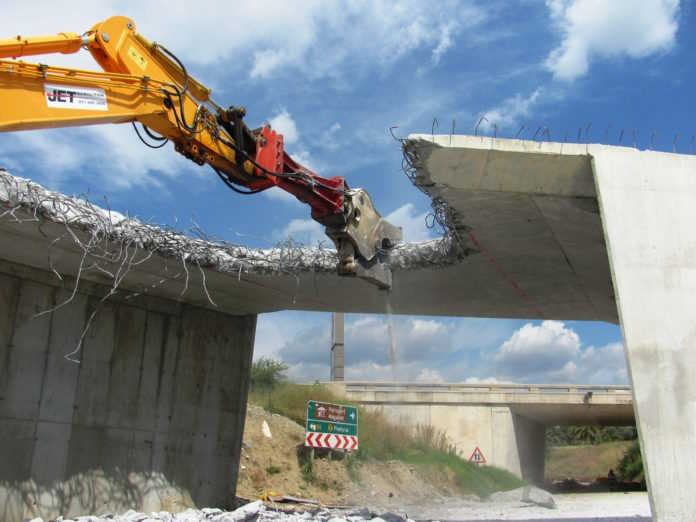Due to a highly experienced team and fully equipped demolition fleet, Jet Demolition is well suited to respond rapidly and safely to emergencies and unforeseen events. With its core business based on risk mitigation, the company can rapidly assess the condition of any distressed structure.
It also considers the operating environment so as to identify and develop the most risk-adverse approach to the works. “Our teams establish the necessary resources to rapidly, and as safely as practically possible, support our client in their most challenging times,” comments Jet Demolition Contracts and Project Manager Kate Bester.
Emergency response situations are unique and depend on the required outcome. For example, a partially collapsed structure within an operational industrial facility may require an immediate in-person response by an operations manager and structural engineer, who will then join the client’s emergency response team to assess the structure and develop an appropriate approach.
In other cases, the most appropriate response would be to mobilise heavy equipment before being able to undertake any mitigating works. Jet Demolition liaises with its clients to develop the appropriate plan and then mobilises accordingly. “Our priority is always safety. We work with large, multinational clients who invariably share the same principles,” stresses Bester.
In an emergency response situation, the aim is to ensure that the situation does not escalate any further. Jet Demolition assesses the risk, draws on the competence, skill and experience of the team, and consults with all relevant stakeholders. It proceeds with extreme caution and regroups where necessary.
“It is not uncommon for a methodology to be amended as works progress,” notes Bester. Thus, change management forms a major part of an emergency response. “We ensure that our client and stakeholders are fully briefed prior to the works commencing, explaining that change and adaptation might be necessary in the interest of safety.”
While the company has mobilised internationally to assist with emergency response scenarios, the distance and extent to which it can assist is typically guided by the severity and urgency of the works that need to be undertaken. For example, it is not practically possible to establish and mobilise its own plant and equipment to an international project where unforeseen collapse may be imminent. However, if required it will mobilise skilled personnel to work with local contractors and clients and adapt its approach to suit the resources that may already be available on-site.
“We firmly believe that the best way to prepare for an emergency is to hone your skills. Due to the nature of our work, we have the opportunity to learn something new every day and therefore improve our skill level,” says Bester. Under duress and distress, clients need to be able to rely on a team that can work cohesively, calmly, and with full consideration of all contributing factors.
“This is where we excel,” stresses Bester. Jet Demolition’s personnel very rarely remain within a fixed team for an extended duration. Its approach is rather to standardise its internal processes, procedures and ways of working so that teams can function cohesively and intuitively, even when shuffled. This allows the company to respond rapidly, without the team being reliant on a single person who may already be committed to a remote site.
In terms of the equipment required for any emergency response, this very much depends on the nature of the work to be undertaken. For example, Jet Demolition has responded to a variety of emergency works, some of which required skilled personnel equipped with flame-cutting torches, and others where the appropriate response was highly mechanised.
“The benefit we do have is that we own and operate our own extensive and varied equipment fleet. This means that we can select the safest practical methods, with a range of tools immediately available to us,” highlights Bester.
Technological advances such as specialised tools and equipment play a significant role in contributing to the success of a project and to the safety of personnel. However, skill and experience are what really drives the work to be done. Being able to anticipate how a stressed structure will react often depends on years’ experience and competence, Bester concludes.
Connect with Jet Demolition on Social Media to receive the company’s latest news
Facebook: https://www.facebook.com/JetDemolition/?ref=br_rs
LinkedIn: https://www.linkedin.com/company/jet-demolition-pty-ltd/
About Jet Demolition
Jet Demolition has been undertaking industrial demolition works since 1994, and is the leading, largest, and most technically advanced demolition company in Africa. It offers in-house, full-range demolition services, including advanced mechanical solutions and controlled implosions. It actively pursues ongoing development of skills and equipment suited to the changing needs of the industry.
Jet Demolition is a technically based company, with various staff members holding MSc, BSc, and BTech Degrees, as well as National Diplomas, in various engineering fields. This expertise gives it the technical foundation to successfully engineer solutions for large and complex demolition projects, and furthermore fuels its drive to deliver quality projects safely. Jet Demolition strives to offer its clients innovative and technical solutions to demanding demolition challenges.
Jet Demolition Contact
Kate Bester (N.Dip. Civil Engineering, PMP)
Contracts and Project Manager
Phone: (011) 495 3800
Cell: 072 811 5310
Email: [email protected]
Media Contact
Rachel Mekgwe
NGAGE Public Relations












